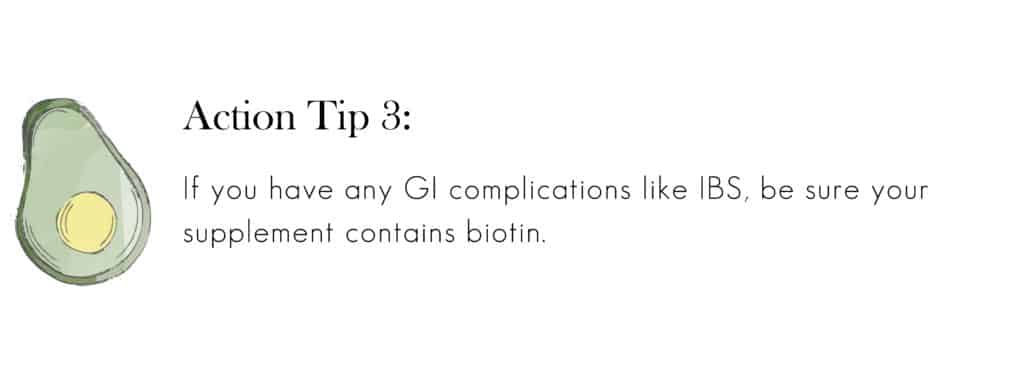What is biotin?
Biotin is a water-soluble* vitamin also known as B7 (1).
You may have heard of it as a supplement to keep your hair, nails, and skin healthy. Tread carefully around biotin supplements advertised as reducing hair loss, acne, or eczema as there is no research to support this (2).
It is still in the early days of biotin research and scientists are still figuring out B7’s role in the body. New studies are examining its function during pregnancy (3) (4) (5) (6) (7).
*This means the vitamin dissolves in water, so any excess biotin you consume that your body does not need, will simply get urinated out.
What is biotin’s role and why is it important during pregnancy?
Biotin is necessary for forming fatty acids and glucose, which are used as fuel by the body (8).
B7 vitamin is also essential for maintaining metabolic processes. For example, synthesizing amino acids from the protein you consume (1) (9).
Biotin has recently been shown to play a role in fetal growth and development (4) (5) (10).
Research is still being done into the transplacental transport of biotin from mother to fetus, but in animal studies, biotin deficiency has shown adverse effects on fetal growth, causing malformations such as cleft palate (6) (11).
What are the signs of deficiency and potential consequences?
Mild deficiency is unlikely to be highlighted on bloodwork and you may not feel any different from usual (9) (11).
Severe deficiency may show itself as hair loss or red scaly rashes. High blood levels of cholesterol have also been linked to biotin deficiency (3) (12).
Approximately 50% of pregnant women are biotin deficient (2) (7).
Animal research studies are showing evidence of biotin deficiency impairing fetal growth (11). Some studies state the risk in humans is low/non-existent (3) but the exact role of biotin during pregnancy is still being researched so it is important to maintain adequate amounts throughout pregnancy and lactation. Biotin recommendations are discussed later.
Where can I find biotin?
Our bodies cannot make biotin themselves, so we rely on our diet to provide adequate amounts of biotin (1).
Similarly, a fetus is completely reliant on the mothers’ diet for its biotin supply, which is transported via the placenta (9) (10).
Many foods contain higher levels of biotin when they are raw (13) but these should only be consumed raw if it is safe to do so, of course.
In contrast, the biotin available in eggs is best obtained when cooked – in raw egg whites, there is a glycoprotein that binds to dietary biotin meaning it cannot be absorbed. Cooking will prevent this binding from happening (8) (13).


Where can I find biotin?
Our bodies cannot make biotin themselves, so we rely on our diet to provide adequate amounts of biotin (1).
Similarly, a fetus is completely reliant on the mothers’ diet for its biotin supply, which is transported via the placenta (9) (10).
Many foods contain higher levels of biotin when they are raw (13) but these should only be consumed raw if it is safe to do so, of course.
In contrast, the biotin available in eggs is best obtained when cooked – in raw egg whites, there is a glycoprotein that binds to dietary biotin meaning it cannot be absorbed. Cooking will prevent this binding from happening (8) (13).
Below are the foods highest in biotin:
Micrograms (mcg) per serving
- Beef liver (cooked) 30.8
- Egg (cooked) 10.0
- Peanuts (roasted, salted) 4.91
- Egg yolk (cooked) 4.08
- Salmon (pink, canned in water) 3.69
- Porkchop (cooked) 3.57
- Mushrooms (canned) 2.59
- Sunflower seeds (roasted, salted) 2.42
- Hotdog, chicken, and pork (cooked) 2.06
- Strawberries (fresh) 1.67
- Hamburger patty (cooked) 1.65
- Almonds (roasted, salted) 1.32
- Sweet potato (cooked) 1.16
- Broccoli (fresh) 1.07
Amounts adapted from Staggs et al 2004
It is worth noting that most meats and cereals have been found to contain more protein-bound biotin than free biotin (9) (13).
Protein-bound biotin must be broken down before it can be used (1) (11). Free biotin is used to maintain all processes mentioned earlier (e.g. amino acid metabolism) and due to its water solubility, almost 100% is absorbed (9) (11).
Free biotin can be found in fresh fruit and vegetables, as well as supplements.
 How much biotin do I need before, during, and after pregnancy?
How much biotin do I need before, during, and after pregnancy?
There are three different ways of expressing the amount of any nutrient or vitamin (9):
EAR – Estimated Average Requirement
This is the minimum intake required to maintain a healthy level in the body.
RDA – Recommended Dietary Allowances
This is the amount of intake required to meet the needs of most healthy people.
AI – Adequate Intakes
This is only ever provided if there is not sufficient scientific knowledge to provide EARs or RDAs (3). These are based on experiments or observations of healthy people and represent a goal intake, like RDAs.
According to the European Food Safety Authority (EFSA), the AI of biotin is:
40 mcg for adults and pregnant women
45 mcg for lactating women
However, the research found that women with an average intake of 57 mcg still show signs of deficiency (4) and that approximately 2-3 times more than the current AI is needed during pregnancy and lactation (4).
More research into biotin is needed, but we know that toxicity does not occur as excess biotin is peed out (8).
So, it is safe to be taking supplements that contain around 100 mcg of biotin.
Adequate intake of biotin throughout early and late pregnancy, as well as post-partum, is important for mother and baby’s health (5).
Should I be supplementing?
Biotin can be found in some prenatal and pregnancy vitamins but not all of them, so it is worth checking.
The biotin in supplements is free biotin so your body and baby can absorb as much as needed.
As some research shows biotin needs are much higher during pregnancy and lactation (4) (5) (7), it may be necessary to supplement with biotin to meet your body’s needs. It is important to tell your health professional you will be doing this as it can affect various test results (14).
 Higher rates of biotin deficiency can be found in women with Irritable Bowel Syndrome (IBS) and Gastritis Disease (9), so if you have either of these or are undergoing anticonvulsant therapy*, check with your health professional about biotin supplementation.
Higher rates of biotin deficiency can be found in women with Irritable Bowel Syndrome (IBS) and Gastritis Disease (9), so if you have either of these or are undergoing anticonvulsant therapy*, check with your health professional about biotin supplementation.
*Anticonvulsant drugs can reduce your levels of biotin, but supplementation is effective if they are taken a few hours apart (9).
The Bottom Line
- Biotin is an essential nutrient for you and your baby.
- Incorporating fresh foods that are rich in biotin can reduce your risk of deficiency.
- Check your prenatal supplements to see if biotin is included.
- Continue with an increased level of biotin intake while breastfeeding.
Written by: Anna Redding, BSc Nutrition
Reviewed/edited by: Ryann Kipping, MPH, RDN, CLEC, Owner/Founder


